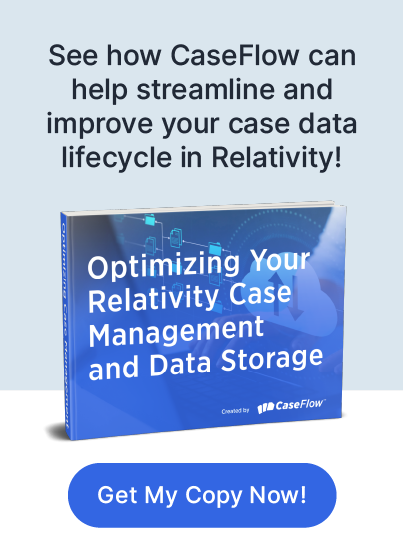7 Relativity Storage Limit Tips for Automated Data Lifecycle Management

As data volumes increase exponentially, legal teams find themselves struggling with time-consuming administrative tasks related to managing their digital assets throughout their lifecycles. These challenges often result in storage limit issues, increased costs, and inefficient resource allocation that impact budgets and case outcomes.
The solution is automated data lifecycle management: transitioning case data through appropriate storage states based on business needs. Implementing strategic automation via tools like CaseFlow means law firms can dramatically reduce their administrative burden while ensuring that they stay within Relativity storage limits.
Read on to learn how CaseFlow works alongside Relativity to automatically transition cases between lifecycle stages, so you can see how your firm can optimize performance and reduce costs.
1. Understand the Data Lifecycle Management Challenge in Relativity
The reality for most litigation support teams is a constant struggle with:
- High volumes of clients and matters across Relativity's various storage states
- Time-consuming manual processes that are required to run activity reports and identify inactive matters
- Cost implications of inefficient data storage management
- Compliance risks associated with improper data lifecycle management
These challenges create a significant administrative burden that distracts from high-value work. It also exposes firms to unnecessary costs and compliance risks. Without automated solutions, lit-support teams find themselves constantly playing catch-up.
2. Map Your Relativity's Data Lifecycle Stages
Relativity offers several distinct storage options that serve different purposes in the data lifecycle:
- Staging: This is used to prepare data for processing and importing into RelativityOne. It serves as a temporary holding area for ARM archives awaiting restoration or raw data prior to processing.
- Repository Workspace: This is ideal for storing documents and coding decisions for future use, particularly in early case assessment workflows.
- Review Workspaces: Designed for active document review, coding, and production, these workspaces host matters that are currently being worked on but should transition to more cost-effective storage when review activity ceases.
- Cold Storage: This is optimal for inactive cases that need to be retained for extended periods but can be brought back online when required. Placing inactive case workspaces into cold storage significantly reduces costs.
Understanding these storage tiers is the foundation of effective data lifecycle management. The challenge is knowing when and how to transition matters between these states based on activity levels and business requirements, and this process only becomes harder to recognize as case volumes grow.
3. Implement Continuous Monitoring for Data Lifecycle Management
Manual tracking of case activity across hundreds or thousands of matters is virtually impossible without significant resource investment. Implementing systems that continuously monitor case activity throughout your Relativity instance eliminates the need for time-consuming manual reporting and provides real-time visibility into storage utilization.
CaseFlow’s case management solutions help litigation support teams:
- Automatically track user activity across all workspaces to identify inactive matters
- Generate alerts when matters have been dormant for specified periods
- Replace manual activity reports with automated monitoring systems
- Identify natural transition points in the case lifecycle based on activity patterns
4. Establish Rule-Based Automated Transitions
Once you've implemented continuous monitoring, the next step is to eliminate the manual effort required to transition matters between storage states. Automation is the key to scalable data lifecycle management in Relativity environments.
Effective automation requires establishing clear rules for when and how matters should transition through their lifecycle stages. This includes:
- Creating customizable rules based on inactivity periods, matter status, and client requirements
- Automating transitions from active to repository mode based on predefined triggers
- Setting up workflows for moving appropriate matters to cold storage
- Implementing exception handling for high-priority or special case types
- Establishing approval workflows that require minimal intervention from legal teams
With CaseFlow, these transitions happen automatically based on your firm's specific requirements. The system continuously monitors the entire Relativity instance and executes administrative actions according to configurable rules at the instance and client/matter levels.
5. Configure Smart Archiving Alerts and Workflows
Archiving represents a critical phase in the data lifecycle, but it also carries significant risk if executed without proper communication and verification. The ideal solution combines automation with appropriate safeguards to ensure that data isn't prematurely taken offline.
CaseFlow addresses these challenges by automatically identifying inactive matters based on configurations that match data retention rules for each client. Before archiving, the system notifies all stakeholders to prevent taking a case offline inadvertently, with stakeholders able to stop auto-archive actions with a single click that resets the timer.
6. Leverage On-Demand Actions for Batch Processing
While automation handles routine transitions, litigation support teams need tools for managing exceptions and performing batch operations across multiple matters. Flexible, on-demand tools complement automated workflows by providing administrative control when required.
CaseFlow's Actions On-Demand feature addresses these needs by enabling administrators to schedule data lifecycle actions for single or multiple matters through a unified interface, thereby eliminating the time-consuming process of manually executing these actions within Relativity.
7. Measure Success Through Storage Optimization Analytics
The final component of effective storage management is measuring the impact of your data lifecycle initiatives. Without clear metrics, it's impossible to demonstrate ROI or identify opportunities for further optimization.
The Benefits of Implementing CaseFlow
Law firms that have implemented CaseFlow's automated data lifecycle management solution are experiencing dramatic improvements in operational efficiency and cost management.
Reclaim Hundreds of Hours with Automated Transitions
For a mid-sized law firm managing hundreds of Relativity Matters, the manual work of running activity reports, coordinating transitions, and executing storage moves consumes hours per week. CaseFlow eliminates these repetitive tasks entirely through continuous monitoring and automated execution. This means you can reclaim time previously spent on manual storage management tasks.
Slash Storage Costs Through Optimized Tier Management
The cost of storage represents one of the largest line items in Relativity hosting budgets. Upon automatically transitioning inactive matters to appropriate tiers, CaseFlow clients consistently report significant storage cost reductions within the first six months of implementation.
These savings come from the:
- Automatic identification of Repository conversion candidates
- Timely transition of dormant matters to cold storage
- Proactive archiving of completed matters to remove them from billable storage entirely
- Prevention of unnecessary staging area overages through continuous monitoring and cleanup
Eliminate Compliance Risks Through Consistent Policy Enforcement
Consistent application of data retention policies isn't just good practice; it's essential risk management. CaseFlow's automated approach ensures that:
- Every matter is handled in accordance with documented retention policies.
- Human error is eliminated.
- Client-specific agreements are consistently honored through customized rules.
- Regular audits verify compliance with internal policies and external regulations.
- Complete documentation provides defensible evidence of proper data handling.
The value of this risk mitigation extends far beyond simple storage savings. It protects firms from potential penalties and reputation damage that traditionally result from improper data handling.
Switch Your Team's Focus From Maintenance to Innovation
Perhaps the most significant benefit of implementing CaseFlow is how it transforms the focus of your litigation support team. Rather than spending their days on repetitive maintenance tasks, these skilled professionals can redirect their expertise to process improvement, strategic case support, and technology innovation.
Before CaseFlow, law firms were constantly playing catch-up with storage management. Now, firms can finally focus on implementing advanced analytics and developing customized workflows that deliver a real competitive advantage for attorneys.
Experience Seamless Integration and Zero Disruptions
Unlike the many legal technology implementations that require significant downtime or workflow changes, CaseFlow easily integrates with your existing Relativity environment. It works alongside your current processes, enhancing rather than replacing them, and can be deployed with minimal disruption to ongoing operations. The solution enables firms to immediately begin capturing benefits without the typical change management challenges that accompany new technology adoptions.
Final Note
Managing Relativity storage limits effectively requires a systematic approach to data lifecycle management that balances performance, compliance, and cost considerations. Automated solutions enable law firms to dramatically reduce the administrative burden of managing growing data volumes while optimizing their Relativity investment.
CaseFlow works alongside the platform to enhance its native capabilities, continuously monitoring your entire instance and automatically executing administrative actions based on customizable rules. The result is a more efficient and cost-effective environment that scales with your firm's needs, while significantly reducing your case load.
Ready to take control of your Relativity data lifecycle and eliminate unnecessary costs and wasted time? CaseFlow provides the automation that you need to proactively manage your Relativity storage, seamlessly transitioning cases through Repository, Cold Storage, and Archive based on your specific requirements. Don't let manual processes bog you down; see how CaseFlow can save your law firm time and money. Contact us today, and discover the power of automated Relativity data lifecycle management.



